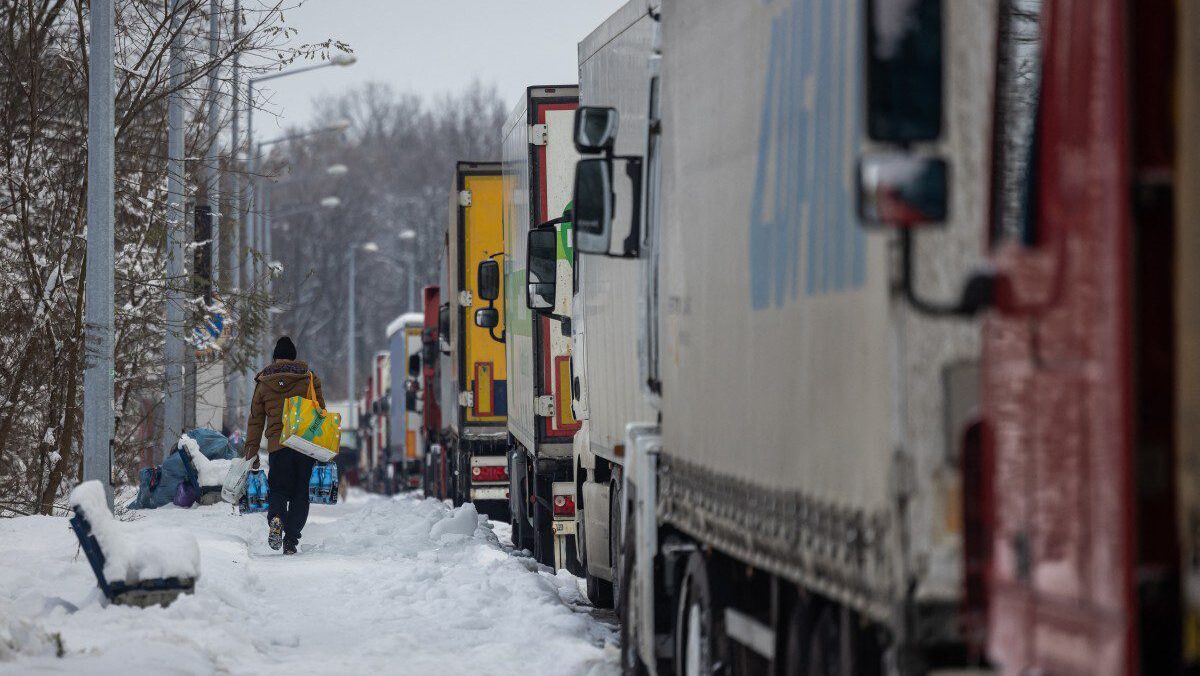
A Ukrainian truck driver walks past Ukrainian trucks as he carries bags full of groceries, on the parking lot near Korczowa Polish-Ukrainian border crossing, on December 5, 2023.
Photo: Wojtek Radwanski / AFP
Polish farmers have rejoined a blockade by truckers on the border with Ukraine this week to protest potential tax increases and make sure the government does not renege on corn subsidies as new left-wing Europhile Polish Prime Minister Donald Tusk faces his first major challenge.
While Tusk’s coalition government includes agrarian parties, his election campaign also made promises to bring Poland in line with demands from the EU. Tusk, the former president of the European Council, convinced the Commission to release €5 billion in frozen recovery funds even before officially taking office as the country’s new PM.
Tusk, who has been in office for less than a month, has previously pledged to end the blockade on the Medyka border crossing to improve relations with Ukraine. While the farmers did halt their blockade for several days over Christmas, they have again decided to prevent traffic across the border, a Financial Times report notes.
The truckers began their protest on November 6 and were joined by farmers on November 23rd. Farmers stopped just a month later when Poland’s Agriculture Minister Czeslaw Siekierski, a seasoned politician from the agrarian Polish People’s Party, came to the protesters and told them their demands would be met.
Roman Kondrow, the leader of the group behind the protest, spoke to Polish media earlier this week saying, “If we do not receive written confirmation that our demands will be met, we will return to the blockade.”
“It is important for us that we receive assurance that our demands are met in writing. If the minister cannot give such an assurance, let the prime minister write it,” he said and added, “I’ve already had talks with the police and the crisis management team. Everything is ready to continue the protest. However, if we receive written assurances that our demands will be met, the protest will be definitively ended.”
It appears that no written assurance was delivered by the agriculture minister or Prime Minister Tusk, who said that the continuation of the protest “does not make negotiations easier” and said ending the blockade as soon as possible was a priority.
The continuation of the protests comes after Tusk had said, “I will convince Polish hauliers not to use blockade as a method of defending their interests. Our arguments will be better heard when Poland is not a country blocking the border.”
Polish truckers and farmers have long been angered by Ukrainian grain imports into Poland, which have undercut local prices and led the country’s former conservative government to ban Ukrainian grain imports alongside Slovakia and Hungary after EU restrictions ended last September.
The policy led to an increase in tensions between the former Polish government and Ukraine to the extent that Poland, once one of the staunchest allies of the Ukrainian war effort, halted sending weapons to the country.
Prime Minister Tusk, however, has promised to change Poland’s course regarding Ukraine and slammed those in the West last month who he claimed were expressing “fatigue” over the conflict with Russia.
Poland’s Foreign Minister Radoslaw Sikorski added, “We will continue the policy of supporting Ukraine, both in defending against Russian imperialism and in its European aspirations.”
The farmer protests could prove a challenge for Tusk, however, as he attempts to balance the opinions of Polish farmers and others with his desire to repair relations with Ukraine and his campaign promises to improve Poland’s relationship with the EU.
